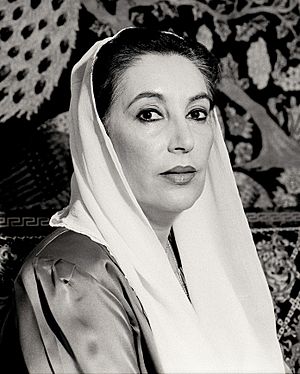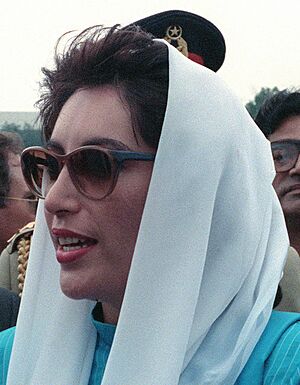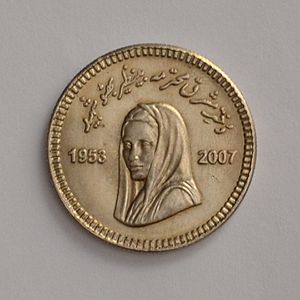Benazir Bhutto facts for kids
Quick facts for kids
Benazir Bhutto
|
|||||||||||||||||||||||||||||
|---|---|---|---|---|---|---|---|---|---|---|---|---|---|---|---|---|---|---|---|---|---|---|---|---|---|---|---|---|---|
| بينظير بُھٹو | |||||||||||||||||||||||||||||

Bhutto in 2006
|
|||||||||||||||||||||||||||||
| 11th and 13th Prime Minister of Pakistan | |||||||||||||||||||||||||||||
| In office 18 October 1993 – 5 November 1996 |
|||||||||||||||||||||||||||||
| President | Wasim Sajjad (acting) Farooq Leghari |
||||||||||||||||||||||||||||
| Preceded by | Moeenuddin Ahmad Qureshi (caretaker) | ||||||||||||||||||||||||||||
| Succeeded by | Malik Meraj Khalid (Caretaker) | ||||||||||||||||||||||||||||
| In office 2 December 1988 – 6 August 1990 |
|||||||||||||||||||||||||||||
| President | Ghulam Ishaq Khan | ||||||||||||||||||||||||||||
| Preceded by | Muhammad Khan Junejo | ||||||||||||||||||||||||||||
| Succeeded by | Ghulam Mustafa Jatoi (caretaker) | ||||||||||||||||||||||||||||
|
|||||||||||||||||||||||||||||
| Personal details | |||||||||||||||||||||||||||||
| Born | 21 June 1953 Karachi, Federal Capital Territory, Pakistan |
||||||||||||||||||||||||||||
| Died | 27 December 2007 (aged 54) Rawalpindi, Punjab, Pakistan |
||||||||||||||||||||||||||||
| Cause of death | Assassination | ||||||||||||||||||||||||||||
| Resting place | Bhutto family mausoleum | ||||||||||||||||||||||||||||
| Political party | Pakistan People's Party | ||||||||||||||||||||||||||||
| Spouse | |||||||||||||||||||||||||||||
| Relations |
|
||||||||||||||||||||||||||||
| Children |
|
||||||||||||||||||||||||||||
| Parents | Zulfikar Ali Bhutto Nusrat Bhutto |
||||||||||||||||||||||||||||
| Education | |||||||||||||||||||||||||||||
| Signature | |||||||||||||||||||||||||||||
Benazir Bhutto (born June 21, 1953 – died December 27, 2007) was an important Pakistani politician. She served as the Prime Minister of Pakistan two times. She was the first woman ever elected to lead a democratic government in a country where most people are Muslim. She led the Pakistan Peoples Party (PPP) from the early 1980s until she was assassinated in 2007. Benazir Bhutto believed in liberalism and secularism, which means she supported freedom and keeping government separate from religion.
Contents
Her Early Life and Education
Benazir Bhutto was born in Karachi, Pakistan. Her family was very wealthy and important in politics. Her father, Zulfikar Ali Bhutto, was also a famous politician. When Benazir was young, her father became a government minister and later the foreign minister. This meant she met many important people from other countries, like Zhou Enlai and Henry Kissinger.
She went to college at Harvard University in the United States. Later, she studied at the University of Oxford in England. At Oxford, she became the President of the Oxford Union, which is a famous debating society. Her father became Prime Minister of Pakistan in 1973.
Becoming a Political Leader
Benazir returned to Pakistan in 1977. Soon after, her father was removed from power by the military and later executed. Benazir and her mother, Nusrat Bhutto, then took charge of their family's political party, the PPP. They led a movement to bring back democracy to Pakistan.
During this time, Benazir was put in prison many times by the military government. In 1984, she went to live in Britain for a while. She came back to Pakistan in 1986. She changed her party's ideas from socialist to more liberal ones.
Prime Minister of Pakistan
In 1988, Benazir Bhutto led her party to win the election. She became the Prime Minister of Pakistan. This was a huge moment because she was the first woman to lead a democratic government in a Muslim-majority country.
During her time as Prime Minister, she tried to make many changes. However, some powerful groups, including the military, made it hard for her to succeed. Her government was accused of some problems, and she was dismissed from office in 1990.
After this, she became the Leader of the Opposition. This meant she was the main leader of the parties not in power.
Second Term as Prime Minister
In 1993, Benazir Bhutto's party won the elections again. She became Prime Minister for a second time. In this term, she worked on improving the economy. She also tried to help advance women's rights in Pakistan.
Her second government also faced difficulties. Eventually, she was dismissed from office again.
Life in Exile and Return
After her second term, Benazir Bhutto lived outside Pakistan for about ten years. She lived in places like Dubai and London.
In 2007, she returned to Pakistan. She planned to run in the 2008 elections. Her main goals were to have the people control the military and to fight against violence from extremist groups.
Sadly, after a political rally in Rawalpindi, she was assassinated in December 2007. She was buried at her family's special burial place in Garhi Khuda Baksh.
Her Personality
People who knew Benazir Bhutto said she was charming and very smart. She was also a great speaker, a skill she practiced while at Oxford University. She was known for being strong and having clear ideas. Many people felt she had a special way of connecting with others, just like her father.
Her Family Life
Benazir Bhutto was the oldest of four children. She was very close to her younger sister, Sanam.
In 1987, her mother arranged her marriage to a businessman named Asif Ali Zardari. This was a traditional marriage. She always showed respect and loyalty to her husband, even when he faced difficulties.
Benazir and her husband had three children:
- A son named Bilawal, born in 1988.
- Two daughters, Bakhtawar (born in 1990) and Aseefa (born in 1993).
When she gave birth to Bakhtawar, she became the first elected head of government to have a baby while in office.
Interesting Facts About Benazir Bhutto
- Her first language was English. She also spoke Urdu well, but not much Sindhi language.
- Her parents gave her the nickname "Pinkie" when she was a child because of her rosy skin.
- She loved to read self-help books, saying they helped her through tough times.
- She enjoyed French and Italian food.
- She was a big fan of the American singer Neil Diamond.
- She liked reading romance novels and Hello! magazine, which focuses on celebrities.
- In 1996, the Guinness Book of Records called her the most popular international politician of the year.
- She received important awards, like the French Legion of Honour.
- The Pakistani activist Malala Yousafzai, who won the Nobel Peace Prize, said Benazir Bhutto was a big inspiration to her.
- Several universities and public buildings in Pakistan are named after her.
- The airport in Islamabad was renamed Benazir Bhutto International Airport in her honor.
- She is often called Shaheed-e-Jamhuriat, which means "Martyr of Democracy," by her supporters.
Her Legacy
Benazir Bhutto was a very important and sometimes controversial figure. She was criticized by some, but she was also very popular, especially in her early career. Many Western countries saw her as a symbol of democracy.
After her death, she became an icon for women's rights. This is because she achieved so much political success in a society that was mostly led by men.
Benazir Bhutto's Famous Quotes
- “You can imprison a man, but not an idea. You can exile a man, but not an idea. You can kill a man, but not an idea.”
- “Leadership is about the strength of one’s convictions, the ability to endure the punches, and the energy to promote an idea.”
- “...the fight for the truth is important. There will come a day when you will see the result of your struggles.”
Images for kids
See also
 In Spanish: Benazir Bhutto para niños
In Spanish: Benazir Bhutto para niños




